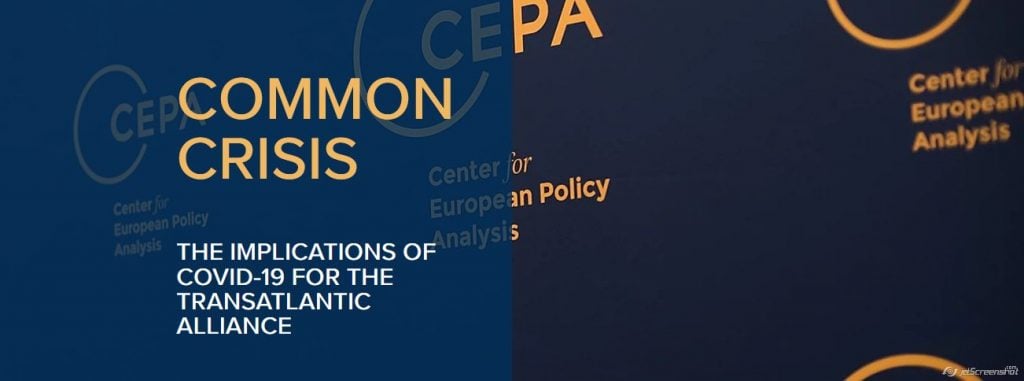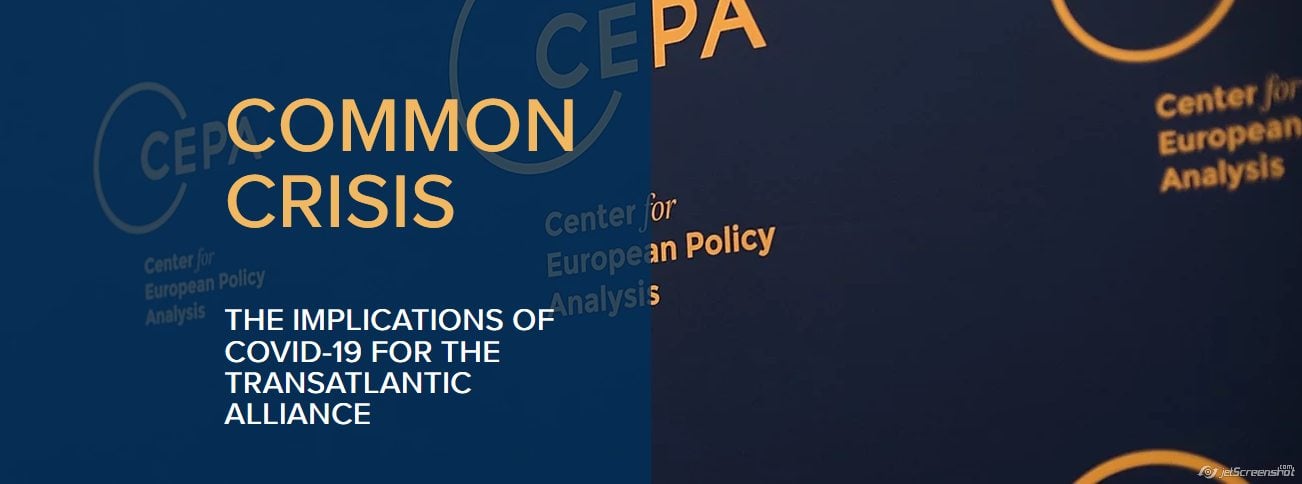
By CEPA
GEOPOLITICS AND THE PANDEMIC: A CEPA FAQ
Alliance cohesion is under increasing strain amid public squabbling between member governments and growing fears of both the likely death toll and the economic damage. NATO has been all but invisible. Public trust in the EU is fraying too. The disarray gives Russia and China plenty of opportunities.
1) What are the consequences right now for transatlantic security?
The much-awaited Defender 2020 military exercises—which would have been the biggest NATO training event since the 1980s—have in effect been canceled. The NATO exercise aimed to test moving a division-sized force from the United States to European training grounds this spring, with 20,000 soldiers conducting training in 10 European countries. The linked exercises—Dynamic Front, Joint Warfighting Assessment, Saber Strike, and Swift Response—were canceled on Monday 16th March. Since January, around 6,000 soldiers had already deployed from the United States to Europe. They include an armored brigade combat team which will “conduct gunnery and other combined training events with Allies as part of a modified Allied Spirit exercise,” Army officials said in a statement.
2) What about alliance cohesion?
The crisis is challenging the ability of people to travel across borders—a privilege that many in the transatlantic community have taken for granted. On Monday, March 16, French President Macron announced that the European Union will close its external borders for 30 days. This follows the U.S. ban on travel from Europe imposed last week. Italy, the country most affected by the virus, moved to lockdown its borders and more than a dozen other European states have since moved to partially or completely shut their borders. These measures, while necessary from a public health perspective, directly challenge Europe’s Schengen Area agreement that has allowed for carefree movement across the continent for European citizens and visitors for decades.
Comment: Multilateral institutions—designed to coordinate transatlantic responses to common crises—should step in. G7 leaders met (virtually) on Monday—on the initiative of the French President—andvowed to act together towards “doing whatever is necessary to ensure a strong global response through closer cooperation and enhanced coordination of our efforts.” But the G7 commitment won’t be enough as the Alliance faces real national security threats. Already, malicious state actors are exploiting the unfolding chaos to attack and weaken democracies. If these early attempts to undermine our ability to respond are an indicator of things to come, the Alliance risks being bombarded with such “below threshold” attacks as the crisis unfolds. Prioritizing national responses over coordination and cooperation not only make responses significantly less effective but they also undermine the already-strained foundations of transatlantic cooperation.
3) What role is the EU playing?
EU Commission President von der Leyen’s reaction of making additional financial resources available and then proposing the closure of the borders are reasonable and maybe even popular, but too slow and too late. The reactions to the COVID-19 crisis highlight the very weaknesses the EU has been characterized by and criticized for: forging common positions takes more time than is available in times of crisis.
4) What’s up with disinformation?
Disinformation, propagated by Russia, China, and others is widespread. The anxiety around the COVID-19 pandemic has created ample opportunity to stoke public mistrust. These narratives range from pro-Kremlin tropes, to clickbait conspiracy theories and fear-mongering. China has explicitly blamed the United States for being the source of the pandemic. Pro-Kremlin online outlets and social media groups are already spinning disinformation regarding an impending decline of U.S. leadership on the world stage, which will soon be replaced by Russia. Other accounts establish false connections between Defender 2020 and the pandemic, alluding to a great power confrontation that uses innocent people as its pawns. Such narratives are being translated into various languages, sometimes republished by Sputnik News, and spread by disinformation peddlers on social media and via encrypted messaging apps.
5) Where are these narratives working?
In Romania, disinformation spread by fringe groups sometimes finds its way into mainstream publications that indiscriminately publish unverified content. One such article on NATO Defender 2020 puts forward a conspiracy theory about the U.S. military presence in Italy, claiming that American soldiers are immune because the virus was created in U.S. laboratories.
An apparently well-sourced German news story claimed that President Trump had personally intervened to lure a German vaccine company to the United States, in the aim of making its product available only to the American market. This story was false, but served to undermine further confidence among European allies in the U.S.-led rules-based international order.
6) What’s China up to?
China scored a notable breakthrough with a modest shipment of humanitarian supplies to Italy, so far the hardest-hit country in Europe. This contrasted with the decision by the German government to restrict the export of medical supplies and accentuated Italians’ feeling of abandonment. The crisis is also providing China with the opportunity to deploy soft-power in the Balkans. Serbian President Aleksander Vučić issued an extraordinary public statement on March 15 decrying Europe and saying that his country’s only hope lies in China, calling Chinese General Secretary Xi Jinping his “friend and brother.” Vučić assailed the European Union for refusing to export medical equipment to Serbia and asked China to send “everything…even to send us doctors.” Vučić added that “European solidarity does not exist and “was a fairytale on paper.”
7) What about Brexit?
The British government shows no sign of backtracking on any aspect of its Brexit policy and downplays its EU ties. The Health Secretary Matt Hancock is not attending—and was not invited to—meetings with his EU counterparts. The UK ‘s continued membership of the EU’s Early Warning and Response System (EWRS) for pandemics is in doubt too as it would require Britain to remain under the jurisdiction of the European Court of Justice. Brexit talks have been postponed, raising fears that the already tight timetable for a deal by the year-end will be impossible.
8) Can the military help?
The Department of Defense is uniquely organized within the U.S. government, with globally positioned, regional commands that can carry out operations including humanitarian assistance. The U.S. military played a significant role in the 2014 Ebola outbreak in West Africa. In the current situation, U.S. European Command (USEUCOM), and its subordinate Service components, are working closely with U.S. embassies in Europe, U.S. personnel and family members based in Europe, and host nation allies to coordinate medical alerts, and response recommendations. In Poland, thousands of deployed U.S. forces in-country are coordinating mitigation and response to COVID-19 closely with the Polish armed forces, and local authorities. U.S. Northern Command (NORTHCOM) has the DOD lead role for infectious illnesses.
From the late 1990s, Poland has developed significant military medical capabilities for deployed operations including field hospitals, and training thousands of medical personnel. These capabilities of course are dual use, and Poland’s Ministry of Defense has placed its 14 military hospitals and readied its five preventative medical centers to support the Minister of Health’s national effort to fight COVID-19. Military units across Poland, are tying in with emergency cooperation plans in their local regions to support regional authorities. The military is working closely to support civilian medical authorities. Special Operations medical personnel, and the recently rebuilt Territorial Defense Forces (WOT), are playing a role, locally and nationally. Until airports were closed, WOT was on the front lines conducting COVID-19 screening on arriving passengers.
9) What about the economic implications?
The era of austerity is over, with fiscal and monetary policy measures likely on a huge scale to blunt the impact of the crisis. But it will be hard to argue in the months and years ahead that defense spending is a priority. Procurement of big-ticket items such as advanced fighter aircraft, aircraft carriers and nuclear submarines is likely to be particularly vulnerable to pressure for spending on social resilience and healthcare. The long term economic implications of the current pandemic are among the most striking reminders of the need to work together on both sides of the Atlantic.
10) What are the long-term national security implications?
The countries that do best in dealing with the pandemic will be those with strong institutions and high levels of social trust. These states are also the most resilient against hybrid warfare. Russia and China may make tactical gains in the short term by exploiting the confusion over the virus. But in the long term they risk discrediting themselves. This may be why RT and Sputnik, the Kremlin’s two main English-language outlets, are taking a relatively responsible tone, in sharp contrast to the hysteria and myth-mongering being propagated on their Russian services.
By CEPA
Edited by Edward Lucas with contributions from Dr. Alina Polyakova, LTG (Ret.) Ben Hodges, Janusz Bugajski, Réka Szemerkényi, Ray Wojcik, Corina Rebegea, and Brian Whitmore.
Common Crisis is a CEPA analytical series on the implications of COVID-19 for the Transatlantic Relationship. All opinions are those of the author and do not necessarily represent the position or views of the institutions they represent or the Center for European Policy Analysis.





